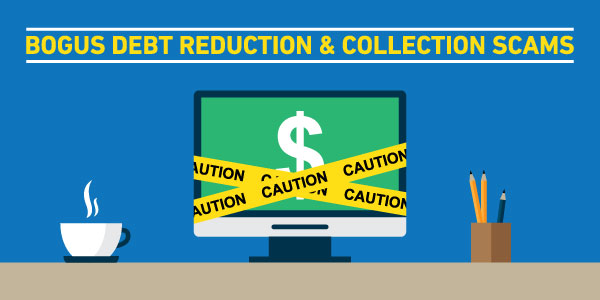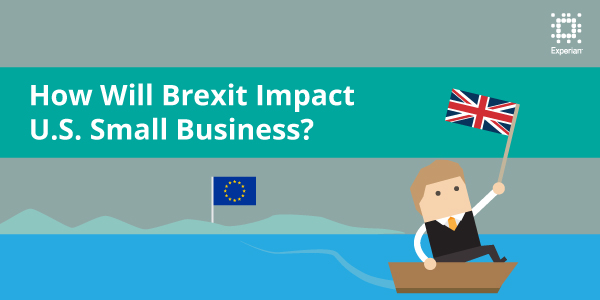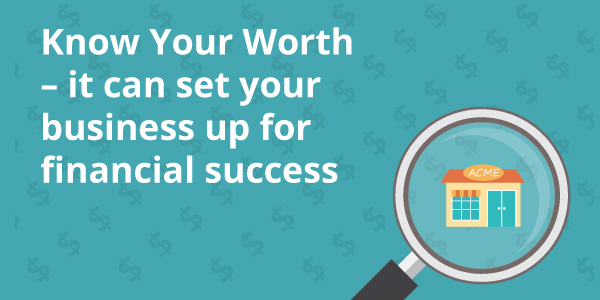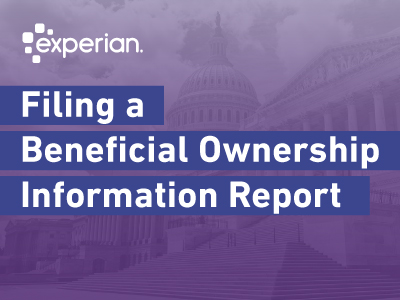Topics

Debt Collection Scams Substantial debt can be a crippling burden to a small business, which is why they are often targeted by con artists who purport they can vastly reduce or even eliminate this debt — for a fee. This type of scam has a long and checkered history — and is showing no sign of abating. In late October of 2016, Ukrainian-born Sergiy Bezrukov — aka John Butler aka Thomas Paris aka Christopher Riley — was arrested by the FBI in upstate New York and charged with mail fraud for having allegedly duped more than 100 small business owners out of more than $500,000. His alleged scheme was simple: mass-mail an offer to reduce small business debt by up to 75 percent in just six to 12 hours. The fee for his services — required upfront — was $1,250, to be sent via wire transfer to his company, Corporate Restructure, Inc. Of course, no actual services were performed. Victims were not only out their initial $1,250, but many had their credit ratings seriously damaged — or further damaged — as a result. “Bogus credit relief schemes are not all that common, but when they do pop up, they give legitimate organizations a bad name,” said Robert Tharnish, senior vice president of ABC-Amega, Inc., a debt collection agency headquartered in Buffalo, N.Y. “There are many ways to deal with commercial debt. Owners just have to do their due diligence.” Robert Ingold, CEO of Commercial Collection Corp. in Tonawanda, N.Y., agrees. “For anyone who receives a solicitation to reduce their debt — be it commercial or consumer — be skeptical. Know who you’re dealing with.” Both Tharnish and Ingold serve on the board of the International Association of Commercial Collectors, the world’s largest international trade association for commercial debt collection professionals. Ingold noted that most companies have accountants and attorneys who should immediately raise a red flag when such sketchy offers come their way. Even so, enough small business owners either don’t have outside help or ignore their paid experts’ advice, allowing scammers like Berzukov to rake in hundreds of thousands of dollars in just a few months’ time. Dealing with a bogus agency can damage already fragile credit ratings, Ingold noted. “In most cases, a company targeted by a debt reduction scammer has debt and delinquencies that have already been noted by reporting agencies like Experian. Bezrukov’s victims weren’t just out their $1,250, but they probably fell further behind in their debt payments expecting relief, and this just decreased their business credit scores even further.” “This is an industry where all you need is a phone and list,” Ingold continued. “We see the same problem on the flip side with fraudulent collection agencies. Fly-by-night collection agencies approach lenders with wild claims of collection prowess, or buy existing paper for pennies on the dollar, then start harassing debtors in violation of all established laws and ethics.” “ Both Ingold and Tharnish noted that the legal system has numerous avenues available for businesses that find themselves over their head in debt. These include: Restructuring the debt with the existing creditors. This often includes devising a monthly payment plan that leaves the business with enough capital to keep growing. Getting an SBA or private business loan. Declaring Chapter 11 or Chapter 13 bankruptcy, which allow businesses to discharge many of their obligations and still keep their doors open. Both experts also emphasized the need for business owners to perform due diligence before hiring any debt reduction or collection agency to work on their behalf. “Ask to see their license. Their certification. Check with the Better Business Bureau,” Tharnish advised. “Also demand references. Ask, ‘Have you done business with anyone I know?’ If an agency can’t provide references, just walk away.” “When confronted with an amazing business solicitation, just remember the old saying,” Tharnish concluded. “If it sounds too good to be true, it probably is.”

Women business owners are feeling pretty positive about the future according to a recent survey by Bank of America titled, “2016 Women Business Owner Spotlight.” The study revealed women small business owners are more optimistic than male business owners about revenue and growth prospects of their businesses. This inaugural survey of 1,000 male and female small business owners, focused squarely on the aspirations and pain points of women. Among the key findings, female business owners are more excited about the future and focused on the success of their business compared to male business owners, with 54 percent of women surveyed expecting revenue to increase over the next 12 months compared to 48 percent of men. Bullish on business growth When considering the growth potential of their business over the next five years, the survey found women respondents felt more optimistic than men. Results showed that 60 percent of women business owners expected their businesses to grow versus 52 percent of men, an 18 point drop for men when compared to 2015. Credit cards The two main sources of funding used by women entrepreneurs include their business credit cards (28 percent) and bank loans (23 percent). Interestingly, 16 percent of women business owners indicated they use personal credit cards to fund their business. However, using personal credit to fund business activities presents some big challenges because if your business ever becomes at risk, it can also affect your personal credit. Experian recommends keeping business credit transactions completely separate from personal credit. Doing so protects personal assets and helps entrepreneurs build strong credit profiles. Also, many lenders are using blended credit scores that evaluate business and personal credit profiles when making lending decisions, so it is best for entrepreneurs to do all they can to build a strong business credit profile. Experian has more information about the dangers of using personal credit to fund your business on the Business Credit Facts web site. Access to capital and clients While access to capital has improved in recent years, many women don’t feel that way. In fact, the study showed that 28 percent of women said they do not have the same access to capital as their male counterparts. Access to clients, however, is one area where women feel they are on more equal footing, with 88 percent saying they have the same or greater access to clients than men. Increasing the minimum wage Women small business owners are more likely to support raising the minimum wage. In fact, the survey indicated that 55 percent of women entrepreneurs think raising the minimum wage would have a positive impact on the economy, compared to only 41 percent of men. Issues that concern small business owners While both women and men small business owners share similar views on top economic concerns over the next 12 months, more women small business owners are concerned about: Corporate tax rates (54 percent of women vs. 45 percent of men). Strength of the U.S. dollar (59 percent of women vs. 45 percent of men). Commodities prices (52 percent of women vs. 44 percent of men). To learn more about the study go to bankofamerica.com

On June 23, 2016, voters in the United Kingdom voted 52 to 48 percent to leave the European Union, the 28-member organization of which it had been a part since the early 1970s. Immediately, the value of the British pound plummeted. Stock markets tumbled worldwide. Financial experts began to warn of an impending European recession. Here, across the pond, owners of small-to-medium-sized enterprises (SMEs) looked at the "Brexit" results with a mixture of concern, confusion and mounting dread. Mostly because we’ve only recently found ourselves out of the massive hole caused by the Great Recession of 2007-09. Could this political shift trigger another, perhaps even more devastating downturn? Based on what we know so far, the answer is: probably not. While the British economy is likely to experience painful contractions over the next few years, U.S. companies will, with only a few exceptions, continue to operate as if the British referendum had never been held. I base my optimism on a number of factors, including the American small business community's economic relationship to the U.K., the increasingly robust state of the U.S. economy in general, and the growing resilience of the SME segment in particular. Brexit and the British Economy For the European Union, Brexit's "Leave" vote was a shock because of what leaving the E.U. may mean for the British economy and Europe as a whole. The United Kingdom represents the E.U.'s largest economy, ranking between the 5th and 10th largest in the world, depending on how one measures such things. For the past three years, it had the fastest-growing economy among all G7 nations, whose membership includes Canada, France, Germany, Italy, Japan and the United States. Its financial district, the City of London, is not only the largest in Europe, it's the largest in the world (yes, even larger than Wall Street.) London's financial industry employees some 750,000 people and is a major source of funding for companies across the Continent. Driven principally by nationalistic sentiment and concern over perceived unchecked immigration (according to exit polls), the "Leave" vote triggered heightened uncertainty throughout London, as well as markets from New York to Singapore. The global economy has become increasingly interconnected and interdependent over the past few decades, and the innumerable questions raised by the U.K.'s disconnection from its European partners sowed confusion and fear. This fear and confusion was manifested in many ways: The British pound fell to a new 30-year-low against the U.S. dollar. Many experts predict that the Pound Sterling could reach a historic one-to-one parity with the dollar by the end of this year. Market values plunged worldwide, causing hundreds of billions of dollars in assets to vanish literally overnight. (Fortunately, most markets have since recovered.) The U.K. relaxed many capital rules to support liquidity – an indication of the Bank of England’s serious concern about Brexit’s impact on U.K. banks. Trading in three sovereign property funds was suspended on July 5th with several more in the following days. Before Brexit, economic forecasters predicted that the British economy would grow some eight percent between now and 2020. Now, most are predicting a contraction of up to six percent. That's a 14 point swing. And because capital is both global and mobile, it would be unwise to ignore the situation. SMEs and the U.S. Economy Here on the west side of the Atlantic, the situation is quite different, especially for small-to-medium-sized enterprises. For one, Europe is not a major customer for most American small businesses. While it's true that 95 percent of the world's consumers live outside the U.S., only about 3.9 percent of U.S. small businesses actually export to the global market. And an even smaller percentage sell to Europe. The vast majority of SME business is done within the borders of the continental United States, hence any direct impact from Brexit is negligible. Then, there is the state of the American SMEs themselves. According to Experian's Main Street Report for Q1 2016, America's SME community is in better shape than it has been in for years: Small business credit conditions continue to improve. Small businesses credit scores are good and improving. Capital is readily available and is appropriately priced. Unemployment is low. (We are approaching statistically full employment.) Delinquencies and bankruptcies have declined in most industries and regions. Recent increases in credit limits suggest that lenders are optimistic about small businesses. So far, Brexit has not had a major impact on the availability or cost of capital here in the United States. Now that the initial panic sparked by the surprise "Leave" vote has subsided, the likelihood of a major worldwide recession grow smaller by the day. This leaves American SMEs well-positioned to continue serving their principally domestic markets, with the credit necessary to fuel further expansion and growth, regardless of what's happening in England, Scotland, Ulster and Wales. For the people of the E.U. and U.K., Brexit may very well represent a major turning point in the political and economic history of Europe. But for most American small businesses, the next few years are likely to mean business as usual — or in the words of the famous WWII-era British motivational poster, American businesses can "Keep Calm and Carry On."

In just one week, Augmented Reality (AR) proved itself to be the Next Big Thing in popular entertainment. Within days of Niantic Labs release of Pokémon Go, in which players "hunt" and "capture" fantastical creatures using their smartphone cameras, tens of millions of Americans have become hooked on the game. According to media reports, the app has already been installed on twice as many phones as Tinder™, is used twice as much as Snapchat, and is surpassing the all-powerful Twitter in its number of daily active users. The skyrocketing value of parent company Nintendo's stock price has provided further testament to the game's perceived long-term stamina. Beyond its nostalgia value -- the game is based on the popular Japanese cartoon and videogame series from the 1990s -- Pokémon Go is winning over hearts, minds and dollars due to its artful blending of fantasy game play and real-world locations. To play the game, participants must move through the physical world, often traveling many blocks or even miles in search of their elusive digital prey. Such material engagement -- and the physical exertion required to complete many of the quests -- is a far cry from the sedentary "couch potato" stereotype so long associated with video-gaming. Shops, restaurants and other commercial operations who find themselves near one of the game's many "Pokéstops"(virtual pit stops) and "gyms" (digital combat arenas) are seeing a marked uptick in foot traffic. Many stores are actively advertising via social media their proximity to game elements and the Pokémon that players have found nearby. Chicago's famed Art Institute received wide coverage for their boasting of various Pokémon found within their hallowed galleries, complete with iPhone screen shots of cartoon monsters perched amidst the Renoirs and Chagalls.

Barry Moltz, Small Business Expert Peter Bolin, Director of Consulting and Analytics for Experian appeared on episode #380 of the Business Insanity Talk Radio Show recently to talk about your business credit score. The show is hosted by Barry Moltz. In this blog post we include a transcript of Pete's appearance along with a link to the recording on Soundcloud. Barry Moltz: A lot of small business owners pay attention to their personal credit score, unfortunately, they don't pay attention to their business's credit score. To discuss this is Peter Bolin who is the Director of Consulting & Analytics at Experian, Peter welcome to the show.Pete Bolin: Thank you very much, Barry. It's very nice to be here.Barry Moltz: Now I don't find too many people who have a LinkedIn profile like yours that starts with "we torture data." So what does that mean?Pete Bolin: That's the truth. We try to use the data assets at Experian to squeeze out as much predictive information, and as much marking information that we can, and to help our customers, and clients and small business owners benefit as much as they can from our data.Barry Moltz: So why is it important, we all know how important it is to have a high personal credit score, but why should the business have a high credit score?Pete Bolin: Having a high credit score for business is critical. It helps them negotiate with creditors better, it helps them negotiate with their wholesalers better and it provides them the opportunity to get the best offer. Get the best rates. Get the best credit terms available and that's all driven by a high credit score.Barry Moltz: Now as a business do you check your credit score the same way you would check your personal credit score for example like on Experian?Peter Bolin: Yes, we have a web site, BusinessCreditFacts.Com, where a small business owner can go and access their credit report, understand all the information. It's very informative, it's very educational. They can even check the credit score planner, which gives them key information on the critical data elements that actually affect their score, and they can start to educate themselves about the factors that they can potentially use to improve their score.Barry Moltz: So Peter what are some of those critical factors? I think we are all familiar with the ones for our personal credit score. What are those for business?Peter Bolin: First of all, you want to make sure that you limit your debt. You want to make sure that you get that as low as possible. You want to make sure that the balance-to-limit ratio which calculates the balances to the total overall balances and keeping that very low will help your credit score. Also, obviously pay your bills on time, that's a big one. Limit the number of inquiries - meaning, limit the number of times you're actually shopping for credit. Only look for credit when you absolutely need it. Those three things are critical in keeping a credit score very high.Barry Moltz: So what's a good credit score for a small business, I know for myself for my personal credit score I try to keep it in the 750's if I can. What is good for a business?Peter Bolin: That depends on each lender. I can say that on average, teh average business credit score, base on our IntelliScore Plus is a 50, it ranges from 1 to 100. So the average score is about a 50. So I would recommend keeping it above that in order to get the best terms and conditions for your loan.Barry Moltz: Well I certainly appreciate you being on the show, where can people get more information on all of this to improve their business credit score?Peter Bolin: BusinessCreditFacts.com, which gives you access to the business credit report and also the score planner which is a key educational feature. Barry Moltz: Pete thanks so much. Peter Bolin: Thank you for having me Barry.

If you’ve ever seen an episode of Shark Tank, then you know that the question of a business’s valuation always comes up. Most of the time, and much to the “Sharks” dismay, the contestants overvalue their companies, or do not know their business’s valuation altogether. And more times than not, this results in the “Sharks” passing on the opportunity to invest in the company. While many small business owners and entrepreneurs may find it difficult to calculate a true valuation of their company, they have an understanding that how much their company is worth can have a significant impact on the business’s financial future. For example, an accurate business valuation can open the door for an entrepreneur to gain access to the financial capital needed to take their company to the next level. Whether it’s a financial institution or a private financier, both investors will want to have every detail at their fingertips as they decide how much funding can be extended to the company. An accurate business valuation provides insight into how far the business has come, as well as how far the business can go in the future – information that any investor would want to know. But the significance of an accurate business valuation doesn’t end there. Many small business owners either outsource their bookkeeping tasks, or have their employees manage the business’s finances. Whichever the scenario, wealth managers, accountants, investment advisors and other finance-related professionals need to have a clear picture of the company’s worth in order to provide counsel on potential investments or other financial decisions. Additionally, a business’s valuation can have an impact on a less obvious, but still important, element of an entrepreneur’s financial well-being – business insurance. Without an accurate valuation, a company could end up being over- or under-insured, which could negatively impact in either scenario. If under insured and something goes wrong, the business suffers, and if over insured, a small business owner is simply wasting funds that could have been allocated to paying down other expenses or used for growth opportunities. Lastly, and perhaps the most common need for an accurate business valuation is during the selling process. In this situation, the value of the business is the most important aspect of the sale, because it serves as the basis of all negotiations. An accurate assessment of the company’s worth can ensure that the business owner will be fairly compensated for their years of hard work and success. In any event, small business owners should not view their business’s valuation as just a number. A complete understanding of the business’s value can have positive implications to the future success of the company, as well as the owner’s financial well-being. Plus, having a keen understanding of their business’s value, will help keep business owners from needing to jump the “Shark,” or at least will better prepare them if they come face to face with one in the future.

In America, entrepreneurs can earn rock star status. From Thomas Edison, Dale Carnegie and Henry Ford to Steve Jobs, Mark Zuckerberg and Elon Musk, Americans deeply respect and even idolize those men and women who start from nothing to build vast fortunes through a combination of ambition, vision, creativity and perseverance. Certainly the free enterprise system has provided more than enough opportunities for both success and failure -- to give our country's entrepreneurs the drama a good rags-to-riches story demands. The need to raise capital, build a winning team, market new and untested products or services, fend off aggressive competitors, and overcome inevitable reversals of fortune are part and parcel of the entrepreneurial experience. However, the odds for success are not good. Historically, about a third of all businesses fail in their first two years, and only about half of start-ups make it beyond five. [1] With so many factors weighing against new companies you have to wonder, why bother? What drives entrepreneurs to risk it all and start their own businesses? The reasons entrepreneurs take the plunge tend to be as varied as the people themselves. Commonly cited reasons include: Independence. Traditionally, entrepreneurs like to blaze their own trails. They want to establish their own priorities, set their own schedules, and do things "their way." Although some may have problems dealing with authority, most entrepreneurs simply like the idea of taking on the responsibilities – and reaping the rewards – only possible when the business is yours. Building Wealth. When you work for somebody else, you're doing just that: Working for the benefit of another person. The only way to make real money is to turn that around, to get other people to work for you. Entrepreneurs understand how wealth is generated in the free enterprise system and recognize that ownership is the surest and fastest way to financial independence. Impact. Steve Jobs famously said that he wished to "make a dent in the universe." Many entrepreneurs are driven by the same desire to "make a difference," to change the world or, at the very least, disrupt their industry. Certainly, the most celebrated American entrepreneurs of the last 150 years have indeed changed for the better the way people live, work and play all around the world. Legacy. There is a universal desire to be remembered. To ensure their legacies, the pharaohs of ancient Egypt built pyramids. While few people today think in terms of giant stone monuments, they do attempt to secure their places in history through building companies that will stand the test of time – and pass wealth down to their heirs. The foundations, institutions and charities that bear the name of some of our most successful entrepreneurs – both living and deceased – represent another form of the immorality so many people pursue. Security. At first glance, starting a business from scratch seems like the riskiest of propositions. At the same time, the effort can also bring unparalleled security. After all, if you're in charge, you can't be laid off. Many of these examples are also echoed by several entrepreneurs that Experian reached out to, to learn what motivated them to leave the security of corporate jobs and strike out on their own. Rieva Lesonsky "The culture where I was working changed significantly. Plus, I was tired of making other people rich," said Rieva Lesonsky, founder and CEO of GrowBiz Media. "Today, the decisions I make, good or bad, are mine. I'm not punished because someone doesn't know what they're doing. If I knew back in 2008 what I know now, would I do it again? In a New York minute!" Brian Moran Brian Moran, founder and CEO of Brian Moran & Associates, tells a similar story. "I spent half my professional career in corporate America and half of it as an entrepreneur. I realized in my last stint in corporate America that some people were just born to be entrepreneurs; I am one of them," he continued. "I love what I do. I get to help other entrepreneurs run better businesses. Every day, when my feet hit the floor, I am excited for the day to start. It’s never dull or boring." Moran also has advice for would-be entrepreneurs about timing when it comes to launching a new enterprise. "The worst time to start a business is when you aren't mentally and physically prepared for the ride," he said. "If you haven't created a real plan of action for your company, then it will only be a matter of time before you hit an obstacle or bump in the road that will start your downfall. Don't waste your time, money and other resources starting a business if you aren't 100 percent committed to making it a success." Are you an entrepreneur? Tell us your story by posting a comment or tweet at @experian_b2b, we would love to hear about your business. [1] https://www.linkedin.com/pulse/20140915223641-170128193-what-are-the-real-small-business-survival-rates

Cash flow is vital for any business. If you don’t have enough cash coming into your business, you could find yourself unable to pay suppliers, or, more importantly, short of the financial resources necessary to invest back into the business and expand. Protect your cash flow by using these three ways to speed up cash collections. 1. Optimize Your Billing Policy Every business needs a formal policy for billing and collections. Set up a formal billing system in your organization that ensures bills are sent out on time. Use a standard format for your bills that encourages people to pay on time and in full. Make sure every bill contains all the details the customer needs to make the payment, as well as a deadline for payment. 2. Monitor Your Receivables It’s vital for any business to know how much cash is coming in on a daily or weekly basis. Put a system in place that keeps track of payments received, as well as tracking which bills are still outstanding. By tracking your cash collections in this way, you can identify which accounts are causing the biggest problems with cash flow in your organization, which means that you can then focus your efforts on those collections. 3. Follow Up Unpaid Invoices When customers don’t pay their bills on time, you need to follow up with them. Begin by sending a friendly reminder that the bill is still due, along with details of how the customer can make the payment. In many cases, this reminder will do the trick, but with some customers, you will need to take a tougher approach. Consider imposing late payment penalties on customers who miss payment deadlines to compensate for the damage that disrupted cash flow can do to your business. Alternatively, you could try offering a small discount for customers who pay within a few days of the invoice. This positive approach encourages customers to deal with invoices as soon as they receive them. Conclusion Cash flow is the lifeblood of any business, so don’t let yours dry up. Follow these tips to speed up cash collections and cut down on the number of bills that go unpaid. Sources http://quickbooks.intuit.com/r/financial-management/five-ways-to-speed-up-your-cash-flow

The IRS audits a small percentage of business tax returns each year. Tax audits take up time and resources, and most small business owners would prefer to spend their time making money. As a result of exhaustive research, we’ve identified these five tips to help you minimize the risk of a tax audit. 1. File Returns on Time It’s true that the IRS has rules governing what happens when you file a return late, and while the initial penalty might not seem that bad, late filing is a trigger. If you routinely file late returns, you’re going to increase the chance you’ll be audited. To avoid temptation, prepare accurate records in a timely manner. If you don’t have the time or skills background to do the accounting yourself, it’s worth hiring someone to do it for you. The best way to ensure that you file on time is to make preparing returns extremely quick and easy to do. 2. Be Cautious About Rounding It’s perfectly acceptable to round up to the nearest whole dollar, but that’s as far as you can go. If you paid yourself a salary of $60,005.32, make sure to report the number as $60,005. If you round to an even $60,000, the IRS may be knocking on your door. 3. Manage Independent Contractors Carefully The IRS is very clear and detailed in their definition of when a worker is considered to be an independent contractor. If you have independent contractors in relation to employees, that could trigger an audit. If you aren’t sure of a worker’s status, get advice from a tax attorney or CPA. You can also file a Form SS-8 with the IRS to get an official ruling. 4. Be Prepared When Claiming Vehicles for Business Use If you claim 100 percent business use of a vehicle, and you don’t have another vehicle for personal use, you’ll need very detailed records. Track the mileage and purpose for each trip that will document the business purpose of all the miles driven each year. 5. Don’t Pay Unreasonably High Salaries Some individuals have been known to pay shareholders who work in the business a very high salary specifically to reduce the company’s tax burden. Avoid any potential issues by ensuring that the salaries paid to shareholders are in line with industry standards. Even if you’re doing everything right, it’s always possible that you’ll be audited someday. Develop a mindset that anticipates the worst. Be rigorous in keeping detailed documentation as if you were going to be audited on an annual basis. You’ll be glad you did if the IRS does call. Sources https://www.americanexpress.com/us/small-business/openforum/articles/7-audit-red-flags-small-businesses-need-to-avoid/http://quickbooks.intuit.com/r/taxes/8-common-tax-audit-triggershttps://www.legalzoom.com/articles/how-to-avoid-a-tax-audit-7-tips-for-small-business-owners
